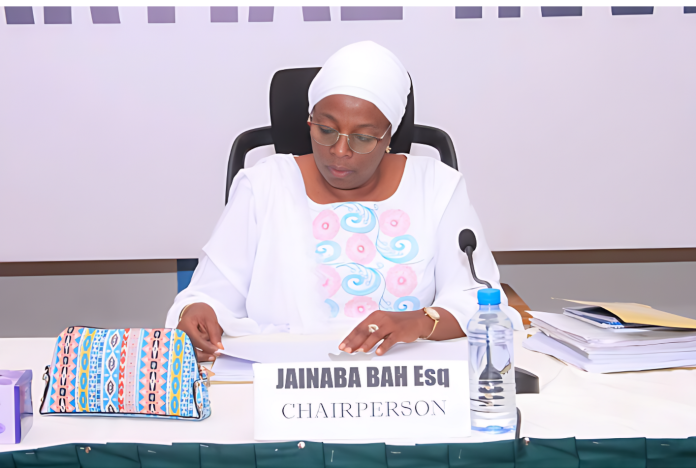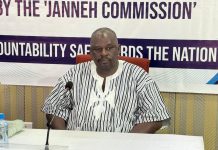By Yankuba Jallow
Landing B. Sanneh, Chairman of the Mansakonko Area Council and resident of Jarra Soma, on Monday appeared before the Local Government Commission of Inquiry to testify about the financial and administrative conduct of his council during the period under review—May 2018 to January 2023. The inquiry seeks to establish transparency and accountability across local government councils.
Sanneh, elected in 2018 and re-elected in 2023 for a second term, admitted in his testimony that the council had faced serious institutional and compliance lapses, which he attributed to low capacity, poor internal control mechanisms, and an underdeveloped work culture. However, he said the council is now undergoing reforms that are beginning to yield results.
His written statement dated 10 November 2023 was admitted in evidence by the Commission.
He said throughout the period under review, the council took out loans and overdrafts from financial institutions, mostly to pay salaries. He told the Commission that the CEO and finance director often took small loans or overdrafts without informing him, and only consulted him for larger sums.
“When the amount is huge, they seek my advice,” he said, noting that overdrafts for salaries were often taken without his knowledge. He further explained that if the amount was substantial, it would be referred to the finance committee.
Lead Counsel Patrick Gomez said the process was inappropriate because the council was being tied to interest-bearing commitments without the authority of the full council. Sanneh agreed with Gomez.
He acknowledged that the council was aware of the provisions of the Local Government Finance and Audit Act and the Financial Manual, which required formal thresholds for expenditure approvals—delineating what the CEO, chairman, or council could approve.
“We were implementing it discretionally,” Sanneh said, but admitted there was no document to support the practice.
He said it was not until 2024 that they formally documented the thresholds and began applying them following the law. “It is no more discretionarily applied,” he told the Commission.
Sanneh said weekly senior staff meetings were held, and additional meetings were called based on need. He was aware of some withdrawals, but not all, and said he was usually informed about activity implementation rather than actual financial transactions.
He also said he reviewed audit reports and sometimes convened audit query meetings. Gomez asked him to provide minutes of those meetings.
The council, according to Sanneh, operates four bank accounts—Trust Bank, Guaranty Trust Bank, Reliance Financial Services, and Salam Microfinance—and maintains a fixed asset register.
Regarding budget preparation, Sanneh explained that departmental heads and ward councillors submit their proposals to the CEO and chairman before tabling them at the general council. However, he admitted that the ward development committees—the community-level structures—are not involved in budget preparation.
On revenue assessment and collection, he said assessments are conducted community by community to identify taxable and non-taxable properties. However, Gomez raised concerns that the same individuals doing the assessments were also responsible for collecting the revenues.
Sanneh responded that he had instructed the collectors to be rotated. “I believe that the instruction was implemented,” he said. But Gomez countered: “You should have followed up to find out whether your instruction was implemented.” He added that the instruction was not implemented.
On the council’s internal audit unit, Sanneh said it existed and was now functional. “As of 2024, they have improved and they have been complying with the recommendations,” he said.
He admitted that the council does not have Standing Orders but said they had recently mobilised resources to hire someone to draft them.
When Chairperson Jainaba Bah asked why the council did not seek assistance from the Ministry of Justice in drafting the Standing Orders, Sanneh replied: “We could have done that, but we did not do that. It is a lapse on our side.”
On the matter of overdrafts taken by the council to pay salaries and office expenses, Chairperson Bah noted that the practice was in contravention of the financial manual. Sanneh acknowledged that he was aware of some of the overdrafts.
Gomez further observed that most payments did not pass through the internal audit unit for pre-payment approval.
“The internal audit was not effectively utilised,” Sanneh admitted. He attributed this to “work culture,” which he said was improving.
The witness also disclosed that the council received COVID-19 relief funds from the Israeli Embassy. While these funds were held in a special account, he confirmed that they were not audited.
He also testified that vehicles were sold by the council through an auction process in which the former finance director, Bai Gibbi Sillah and other staff bought vehicles for D100,000. Sanneh said the council’s contracts committee was involved.
“There was an auction. The process and outcome of the auction were not properly reported,” he admitted.
He said he did not know all the buyers or the exact amounts generated from the auction. Gomez pointed out that the auction lacked GPPA approval and that there was no assessment done to justify selling the vehicles.
“The person selling is the person buying,” Gomez said. He criticised the council’s failure to take disciplinary action.
“I agree. We should have done that. It is an oversight,” Sanneh said.
He said the council focused on recovering money owed from the auction rather than taking punitive actions. “But we could have done that,” he added.
The Commission also questioned him about allegations that Bai Gibbi Sallah procured private receipt books from a businessman in Brusubi. One of the receipts allegedly generated D1.8 million, and 13 books remain unaccounted for. Sanneh said he was not aware of it.
On development initiatives, Sanneh said the council had acquired two plots of land in Soma at D100,000 each, describing the area as a fast-growing business hub.
He admitted the existence of “systemic issues” in the council’s compliance record. He explained that when he took office in 2018, only one staff member held an HND qualification, while others had only high school or no qualifications at all.
Today, he said, the council boasts three staff with master’s degrees, four with bachelor’s degrees, and others with professional certificates.
He argued that the impact of reforms cannot be felt immediately, saying: “Reformation takes time. That is why in 2024, we began realising it has matured.”
Sanneh noted that the council now practices monthly account reconciliations, conducts both pre- and post-audits, and holds regular engagements with the finance unit.
He said the earlier systemic problems were largely related to weak work culture, but the council is now starting to see the benefits of the reforms.
Sanneh is expected to reappear before the Commission today.





















